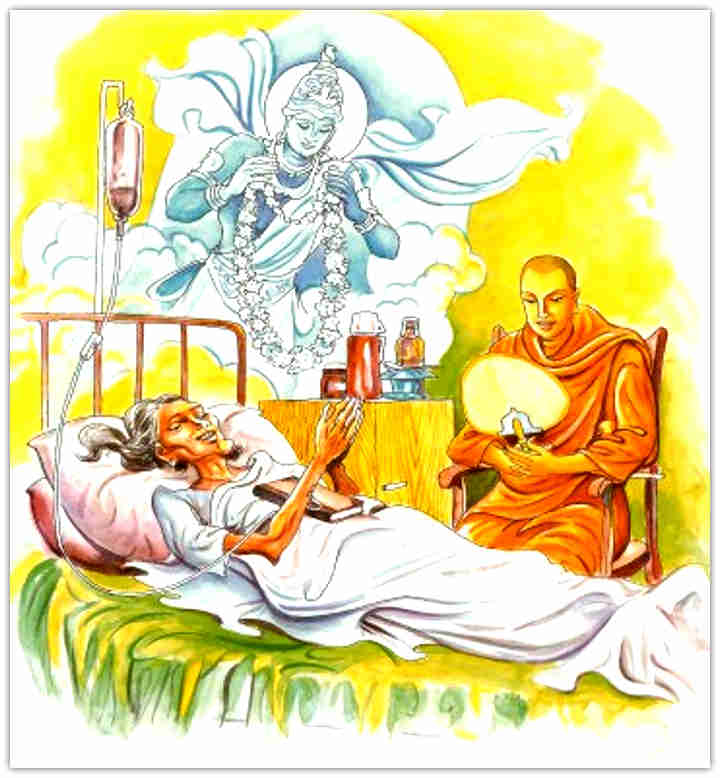Here one’s glad, one’s glad hereafter,
in both ways is the merit-maker glad;
‘Merit I’ve made’, serenely one is glad,
and more one’s glad passed to blissful states.
Explanation: The person who has done good and virtuous deeds rejoices in this world. Gone to a pleasant state of existence after death, he rejoices exceedingly. This way he rejoices here and in the next world. In both worlds he rejoices realizing that he has done virtuous deeds.
The Story of Sumanadevi (Verse 18)
While residing at the Jetavana Monastery in Savatthi, the Buddha spoke this verse, with reference to Sumanadevi, the youngest daughter of Anathapindika.
Every day, two thousand monks took their meal in the house of Anathapindika at Savatthi, and a like number in the house of the eminent female lay disciple Visakha. Anathapindika appointed his oldest daughter Maha Sub-hadda; the latter showed the monks the customary attentions, hearkened to the Law, and as a result obtained the Fruit of Conversion; afterwards she married and went to live with her husband’s family Then he appointed Culla Subhadda, who followed her older sister’s example, obtaining the Fruit of Conversion, and afterwards marrying and going to live with the family of her husband. Finally he appointed his youngest daughter Sumana. Sumana obtained the Fruit of the Second Path, but remained unmarried. Anathapindika was in the refectory when he received his daughter’s message, but immediately went to her and said, “What is it, dear daughter Sumana?” Sumana said to him, “What say you, dear youngest brother?” “You talk incoherently, dear daughter.” I am not talking incoherently, youngest brother.” “Are you afraid, dear daughter?” “I am not afraid, youngest brother.” She said no more, but died immediately.
Although the treasurer had obtained the Fruit of Conversion, he was unable to bear the grief that arose within him.
Accordingly, when he had performed the funeral rites over his daughter’s body, he went weeping to the Buddha. Said the Buddha, “Householder, how is it that you come to me sad and sorrowful, with tears in your eyes, weeping?” “Venerable, my daughter Sumana is dead.” “Well, why do you weep? Is not death certain for all?” I know that, Venerable. But my daughter was so modest and so conscientious. What grieves me so much is the thought that when she died, she was not in her right senses.”
“But what did your youngest daughter say, great treasurer?” “Venerable, I addressed her as ‘dear Sumana’ and she replied, ‘What say you, dear youngest brother?’ Then I said to her, ‘You talk incoherently, dear daughter.’ ‘I am not talking incoherently, youngest brother.’ ‘Are you afraid, dear daughter?’ ‘I am not afraid, youngest brother.’ She said no more, but died immediately.” Said the Exalted One to Anathapindika, “Great treasurer, your daughter did not talk incoherently.” “But why did she speak thus?” “Solely because you were her youngest brother. Householder, your daughter was old in the Paths and the Fruits, for while you have attained but the Fruit of Conversion, your daughter had attained Paths and the Fruits, that she spoke thus.” “Was that the reason, Venerable?” “That was the reason, householder.”
“Where has she now been reborn, Venerable?” In the World of the Tusita gods, householder.” “Venerable, while my daughter remained here among her kinsfolk, she went about rejoicing, and when she went hence, she was reborn in the Deva world.” Then the Buddha said to him, “It is even so householder. They that are heedful, be they lay folk or religious, rejoice both in this world and in the world beyond.”

